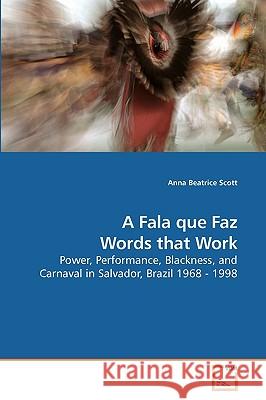A Fala que Faz Words that Work » książka
A Fala que Faz Words that Work
ISBN-13: 9783639235128 / Angielski / Miękka / 2010 / 328 str.
Through a moving body/a mobilized body/a body of movements, A Fala que Faz seeks to understand the deployment of racial identity as politics cum aesthetics. In the groove and on many "ones," Black people in the city of Salvador have utilized the Carnaval as a political tool and sometimes weapon to articulate their needs for unfettered access to the rights of citizenship-space, health, religious freedom, work, fair wages, unmitigated pleasure and joy. Always already in performance, black skin over-stimulates the folly of the Mardis Gras, igniting a decontextualization of pleasure, marking up time and space through its own representation. Through ethnographic research, performance excavation, political economic analyses and oral histories, contestatory voices vie to tell the story of "Blackitude," and make it matter, this telling of things usually parsed over shaking backsides, rhythm, sweat, and spirit.
Through a moving body/a mobilized body/a body of movements, A Fala que Faz seeks to understand the deployment of racial identity as politics cum aesthetics. In the groove and on many "ones," Black people in the city of Salvador have utilized the Carnaval as a political tool and sometimes weapon to articulate their needs for unfettered access to the rights of citizenship-space, health, religious freedom, work, fair wages, unmitigated pleasure and joy. Always already in performance, black skin over-stimulates the folly of the Mardis Gras, igniting a decontextualization of pleasure, marking up time and space through its own representation. Through ethnographic research, performance excavation, political economic analyses and oral histories, contestatory voices vie to tell the story of "Blackitude," and make it matter, this telling of things usually parsed over shaking backsides, rhythm, sweat, and spirit.











